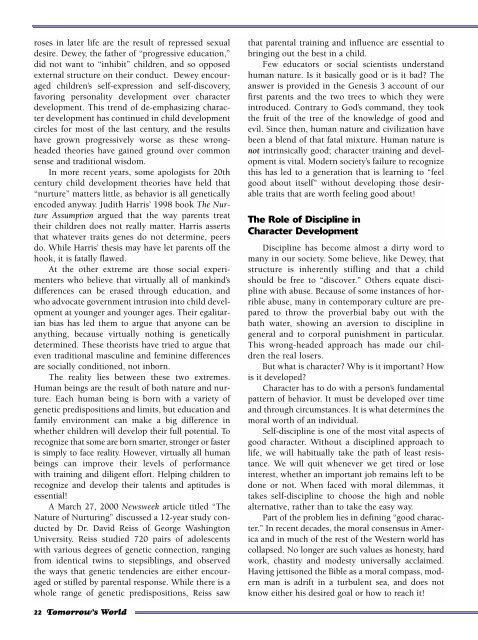Download this Magazine Now (PDF) - Tomorrow's World
Download this Magazine Now (PDF) - Tomorrow's World
Download this Magazine Now (PDF) - Tomorrow's World
You also want an ePaper? Increase the reach of your titles
YUMPU automatically turns print PDFs into web optimized ePapers that Google loves.
oses in later life are the result of repressed sexual<br />
desire. Dewey, the father of “progressive education,”<br />
did not want to “inhibit” children, and so opposed<br />
external structure on their conduct. Dewey encouraged<br />
children’s self-expression and self-discovery,<br />
favoring personality development over character<br />
development. This trend of de-emphasizing character<br />
development has continued in child development<br />
circles for most of the last century, and the results<br />
have grown progressively worse as these wrongheaded<br />
theories have gained ground over common<br />
sense and traditional wisdom.<br />
In more recent years, some apologists for 20th<br />
century child development theories have held that<br />
“nurture” matters little, as behavior is all genetically<br />
encoded anyway. Judith Harris’ 1998 book The Nurture<br />
Assumption argued that the way parents treat<br />
their children does not really matter. Harris asserts<br />
that whatever traits genes do not determine, peers<br />
do. While Harris’ thesis may have let parents off the<br />
hook, it is fatally flawed.<br />
At the other extreme are those social experimenters<br />
who believe that virtually all of mankind’s<br />
differences can be erased through education, and<br />
who advocate government intrusion into child development<br />
at younger and younger ages. Their egalitarian<br />
bias has led them to argue that anyone can be<br />
anything, because virtually nothing is genetically<br />
determined. These theorists have tried to argue that<br />
even traditional masculine and feminine differences<br />
are socially conditioned, not inborn.<br />
The reality lies between these two extremes.<br />
Human beings are the result of both nature and nurture.<br />
Each human being is born with a variety of<br />
genetic predispositions and limits, but education and<br />
family environment can make a big difference in<br />
whether children will develop their full potential. To<br />
recognize that some are born smarter, stronger or faster<br />
is simply to face reality. However, virtually all human<br />
beings can improve their levels of performance<br />
with training and diligent effort. Helping children to<br />
recognize and develop their talents and aptitudes is<br />
essential!<br />
A March 27, 2000 Newsweek article titled “The<br />
Nature of Nurturing” discussed a 12-year study conducted<br />
by Dr. David Reiss of George Washington<br />
University. Reiss studied 720 pairs of adolescents<br />
with various degrees of genetic connection, ranging<br />
from identical twins to stepsiblings, and observed<br />
the ways that genetic tendencies are either encouraged<br />
or stifled by parental response. While there is a<br />
whole range of genetic predispositions, Reiss saw<br />
22 Tomorrow’s <strong>World</strong><br />
that parental training and influence are essential to<br />
bringing out the best in a child.<br />
Few educators or social scientists understand<br />
human nature. Is it basically good or is it bad? The<br />
answer is provided in the Genesis 3 account of our<br />
first parents and the two trees to which they were<br />
introduced. Contrary to God’s command, they took<br />
the fruit of the tree of the knowledge of good and<br />
evil. Since then, human nature and civilization have<br />
been a blend of that fatal mixture. Human nature is<br />
not intrinsically good; character training and development<br />
is vital. Modern society’s failure to recognize<br />
<strong>this</strong> has led to a generation that is learning to “feel<br />
good about itself” without developing those desirable<br />
traits that are worth feeling good about!<br />
The Role of Discipline in<br />
Character Development<br />
Discipline has become almost a dirty word to<br />
many in our society. Some believe, like Dewey, that<br />
structure is inherently stifling and that a child<br />
should be free to “discover.” Others equate discipline<br />
with abuse. Because of some instances of horrible<br />
abuse, many in contemporary culture are prepared<br />
to throw the proverbial baby out with the<br />
bath water, showing an aversion to discipline in<br />
general and to corporal punishment in particular.<br />
This wrong-headed approach has made our children<br />
the real losers.<br />
But what is character? Why is it important? How<br />
is it developed?<br />
Character has to do with a person’s fundamental<br />
pattern of behavior. It must be developed over time<br />
and through circumstances. It is what determines the<br />
moral worth of an individual.<br />
Self-discipline is one of the most vital aspects of<br />
good character. Without a disciplined approach to<br />
life, we will habitually take the path of least resistance.<br />
We will quit whenever we get tired or lose<br />
interest, whether an important job remains left to be<br />
done or not. When faced with moral dilemmas, it<br />
takes self-discipline to choose the high and noble<br />
alternative, rather than to take the easy way.<br />
Part of the problem lies in defining “good character.”<br />
In recent decades, the moral consensus in America<br />
and in much of the rest of the Western world has<br />
collapsed. No longer are such values as honesty, hard<br />
work, chastity and modesty universally acclaimed.<br />
Having jettisoned the Bible as a moral compass, modern<br />
man is adrift in a turbulent sea, and does not<br />
know either his desired goal or how to reach it!



